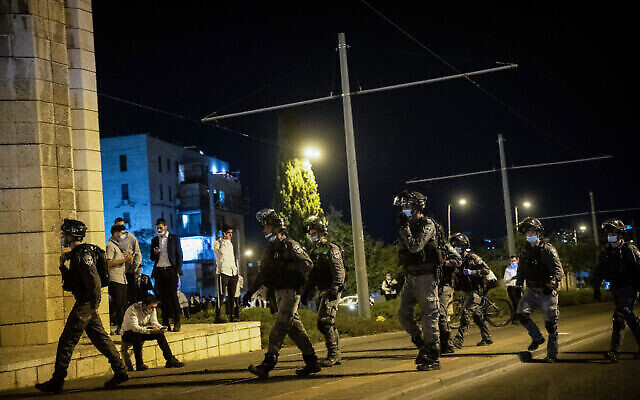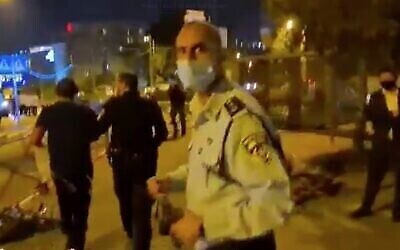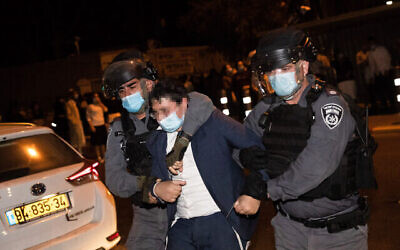Police Said to Agree to Let Hasidim Hold Mass Events as Long as They’re Discreet
Cops deny report Jerusalem commander told several sects that officers won’t enforce virus lockdown if footage and photos of gatherings aren’t publicized

Ahead of the Sukkot holiday, Jerusalem police made a deal with some extremist ultra-Orthodox communities under which they could hold mass events despite the national lockdown on condition that the gatherings are not publicized, Haaretz reported Tuesday.
The report, which police adamantly denied, was based on two sources inside the ultra-Orthodox community, the newspaper said.
According to the report, Chief Superintendent Shimi Marciano, commander of Jerusalem’s Habira station near the ultra-Orthodox Mea Shearim neighborhood, spoke with Hasidic community leaders ahead of the week-long Sukkot festival and came to the agreement.
The report comes as the ultra-Orthodox face mounting criticism over apparently widespread disregard for rules put in place by the government to combat the coronavirus and with infections in their community rapidly spreading.
Sources told Haaretz that representatives of the Toldos Aharon, Toldas Avraham Yitzhak, Dushinsky and Slonin local Hasidic sects participated in the talks.
The sides agreed that communities could hold annual holiday events, which include Simhat Beit Hashoeva celebrations usually attended by thousands, and police would not interfere despite such events being banned under the lockdown regulations on condition that no documentation of what goes on is made public.
As a result, while police carried out a high-profile enforcement drive on Sunday and Monday in Mea Shearim, making arrests and issuing tickets amid violent confrontations with protesters, officers totally ignored some mass events that were being held within meters of the street clashes, the report said.

When questioned about the disparity, police claimed there were no mass events being held and noted the lack of any documentation as support of that statement, Haaretz reported.
The Hasidic groups were said to be satisfied with the arrangement and taking care that no outsiders were allowed in, with one sect even requiring attendees to present a printed invitation.
Sources in the ultra-Orthodox community, also known as Haredi, said that there have been several large events in the Mea Shearim area since Sukkot started Friday night.
An unnamed source said that each Hasidic movement has bouncers stationed at the door checking all those who arrive to ensure outsiders don’t enter. Those who are allowed in are very aware that there is a total prohibition on recording the events.
The source claimed that on Monday “thousands” attended a Simhat Beit Hashoeva event of the Toldos Aharon movement and over a thousand were at a similar celebration hosted by Toldos Avraham Yitzhak.
The celebrations, including music and dancing, are going ahead as they do each year, the source said.
That Israel Police said in statement that although officers had met with Hasidic community leaders before the start of the holiday, the report of an alleged deal allowing events to go ahead amounted to “false claims, which we completely reject.”
The statement added that as part of the preparations for the holiday, police met with representatives from communities to “explain the significance of violating the regulations and enforcement on their [the police’s] part. Further contrary to the claims, the police carried out enforcement of the regulations in the area when and where necessary.”

Criticism of the ultra-Orthodox community has been growing in recent days, with reports showing that a significant number are disregarding lockdown restrictions during the Sukkot holiday, including by continuing to host mass gatherings.
The ultra-Orthodox have seen sky-high coronavirus infection rates with an assessment last week finding that the rate of infection in the community is 2.5 times that of the national average. Spiraling infections across the country prompted the current lockdown, the second this year. Although initially scheduled to be lifted at the end of the Sukkot holiday officials have said it will continue for at least a week longer before any easing of restrictions takes place.
Police said Monday morning that they arrested 18 people overnight in Jerusalem for allegedly disturbing the peace and throwing stones at officers during an operation to enforce coronavirus regulations in ultra-Orthodox neighborhoods in the city. Videos showed violent arrests of some of the protesters, sparking accusations of disproportionate force.
ניצב משנה שימי מרציאנו, מפקד תחנת 'לב הבירה' במשטרת ירושלים רודף אחר מפגין שעף על קיר לבנים ומעיף לו סטירה. התיעוד של @KastelMoti pic.twitter.com/LYPp3BznHY
— Inbar Tvizer ענבר טויזר (@inbartvizer) October 5, 2020
In once clip the Lev Habira station commander Marciano sprinting after a crowd of protesters and then roughly tackling one of them against a wall and then slapping him in the head. In the footage, the protester can be heard calling the officer “a bastard, German, Nazi.”
Marciano was also seen shouting at an ultra-Orthodox woman who complained about his treatment of the youth.
A number of vehicles were damaged during the clashes, including police cars, vehicles belonging to the municipality and cars belonging to private citizens, police said.
There have also been clashes in the largely ultra-Orthodox city of Bnei Brak and the ultra-Orthodox West Bank settlement of Beitar Illit.



comments